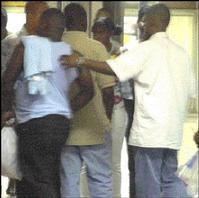
Jamaicans deported from the U.S. earlier this year. - File
A STUDY out of the United States has contradicted the findings from the University of the West Indies research, which diminishes the role that deportees play in crime in Jamaica.
Jamaica was but one of the countries examined by a six-month study by the well-respected U.S. media organisation Associated Press, released last November. The investigation, which included interviews with more than 300 police, deportees, church leaders, social scientists and Government officials in the U.S. and abroad, found that in some countries, the resulting crime waves are overwhelming police and security forces.
About Jamaica, the study said "Ten-thousand strong, most live in the capital city of Kingston the equivalent of 10,000 Jamaican criminals being dumped into the city of Indianapolis..."
CRIMINALS
And in Guyana for example, "more than 600 criminal deportees have been absorbed by a country of less than 700,000 the proportional equivalent of 231,000 Guyanese criminals let loose on the streets of America. Before their arrival, drive-by shootings, car hijackings, kidnappings and bank robberies were relatively uncommon, said Ronald Gajraj, the country's Home Affairs Minister. Now such crimes are a constant part of Guyanese life.
"They are an army of social misfits drug addicts and drunken drivers, robbers and shoplifters, rapists and wife-beaters, drug traffickers and gang members," the report said. "Eighty per cent are being sent to seven Caribbean and Latin American countries Jamaica, Honduras, El Salvador, Colombia, Mexico, Guatemala and the Dominican Republic places where jobs are scarce and police resources are limited..."
ARMED ROBBERIES
The AP study quoted the Jamaican police as saying that deportees have been involved in hundreds of murders and thousands of armed robberies. It said one out of every 106 males over the age of 15 is now a criminal deportee from the United States.
The study seemed less than confident about the reliability of data from the Jamaican authorities, but it said an analysis by the Jamaican police concluded that deportees, many of them gang members from the northeastern United States, were involved in 600 murders in a 20-month period ending in January 1999.
"In proportion to the population, that is equivalent to 60,000 murders in the United States. Over the same period, the constabulary said, deportees were involved in 1,700 armed robberies and 150 shoot-outs with police."
But although it was uncomfortable about local data, and although Yolande Forde, a statistician directing the study, said that the statistics she relied on were incomplete, she added that deportees, often more sophisticated than native thugs, seldom get caught. "The full story of crime in the Caribbean cannot be told statistically, and this is what the United States has to understand," she said.
A SIX-MONTH Associated Press investigation, released in November last year found that deportees are responsible for the crime waves overwhelming police and security forces in some countries including Jamaica.
This study is in stark contrast to the recently released United States-sponsored study done by University of the West Indies professor, Bernard Headley.
The AP study included interviews with more than 300 police, deportees, church leaders, social scientists and Government officials in the U.S. and abroad.
In Jamaica, the study concluded, that one out of every 106 males over the age of 15 is now a criminal deportee from the U.S. Ten-thousand strong, most live in the capital city of Kingston the equivalent of 10,000 Jamaican criminals being dumped into the city of Indianapolis.
CRIMINAL DEPORTEES
Jamaican police say deportees have been involved in hundreds of murders and thousands of armed robberies. In Guyana, more than 600 criminal deportees have been absorbed by a country of less than 700,000 the proportional equivalent of 231,000 Guyanese criminals let loose on the streets of America. Before their arrival, drive-by shootings, car hijackings, kidnappings and bank robberies were relatively uncommon, said Ronald Gajraj, the country's Home Affairs Minister. Now such crimes are a constant part of Guyanese life.
Deported after serving sentences for their crimes in America, the criminal deportees are simply set loose upon arrival, usually with little or no money and with no prospects for work. To survive in what for most of them are unfamiliar surroundings, many turn to the skills learned on the streets of America drug dealing, stealing, extortion, sometimes even murder. Others try to stay out of trouble, but their path is not easy. Some sink into despair, foraging for food or living on handouts sent by family members left behind in America.
LOCAL TEENAGERS
The criminal deportees who most worry receiving countries are the gang members. Soon after they arrive, many reconstitute the street gangs from their 'hoods, recruiting from an inexhaustible supply of local teenagers eager to learn from their American cousins.
Most receiving countries lack the resources to track the deportees, or even determine how many are in prison for crimes committed since their arrival. CARICOM is trying to measure the impact of criminal deportees on four countries in the region, but its study is not expected to produce clear results. Preliminary figures, based largely on prison statistics from the receiving countries, suggest criminal deportees are no more likely to end up in jail than the general population. But Yolande Forde, a statistician directing the CARICOM study, said the statistics she is relying on are incomplete, and that deportees, often more sophisticated than native thugs, seldom get caught. "The full story of crime in the Caribbean cannot be told statistically, and this is what the United States has to understand," she said.



































